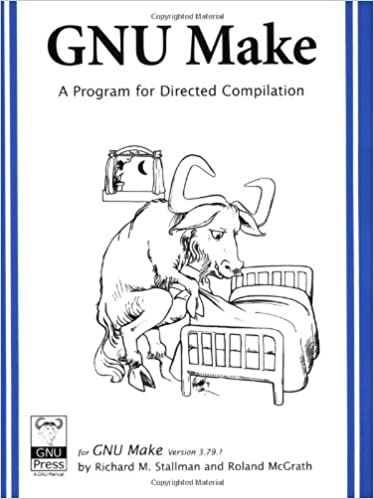Newly released
This book is new and will be uploaded as soon as it becomes available to us and if we secure the necessary publishing rights.

GNU Make A Program for Directed compilation Book PDF
(0)
Author:
Richard StallmanNumber Of Reads:
207
Language:
English
Category:
TechnologySection:
Pages:
192
Quality:
excellent
Views:
1364
Quate
Review
Save
Share
New
Book Description
For GNU Make Version 3.79.1
The Make program is indispensable to maintainers of free software systems. The GNU Make manual, written by the program's original authors, is the definitive tutorial. It also includes an introductory chapter for novice users. The Make utility automates the process of compilation; it is especially useful when the source files of large programs change. It is a small program with a lot of power.
This book will show you: * How to write your own makefiles
* Make's rule syntax and how to write your own rules
* How the Make utility can be configured to automatically put binary and source files in the right places.
* How to use make to create archive files automatically
* Define, set and use Make's variables
* How Make uses targets so that you can broaden or narrow Make's recompilation efforts on demand.
* And much more!
This manual provides a complete explanation of Make, both the basics and extended features. There is also a convenient Quick Reference appendix for experts.
Richard Stallman
Richard Matthew Stallman ( born March 16, 1953) is an American free software movement activist and programmer. He campaigns for software to be distributed in such a manner that its users have the freedom to use, study, distribute, and modify that software. Software that ensures these freedoms is termed free software. Stallman launched the GNU Project, founded the Free Software Foundation in October 1985, developed the GNU Compiler Collection and GNU Emacs, and wrote the GNU General Public License.
Stallman launched the GNU Project in September 1983 to write a Unix-like computer operating system composed entirely of free software. With this, he also launched the free software movement. He has been the GNU project's lead architect and organizer, and developed a number of pieces of widely used GNU software including, among others, the GNU Compiler Collection,GNU Debugger, and GNU Emacs text editor.
Stallman pioneered the concept of copyleft, which uses the principles of copyright law to preserve the right to use, modify, and distribute free software. He is the main author of free software licenses which describe those terms, most notably the GNU General Public License (GPL), the most widely used free software license.
In 1989, he co-founded the League for Programming Freedom. Since the mid-1990s, Stallman has spent most of his time advocating for free software, as well as campaigning against software patents, digital rights management (which he refers to as digital restrictions management, calling the more common term misleading), and other legal and technical systems which he sees as taking away users' freedoms. This has included software license agreements, non-disclosure agreements, activation keys, dongles, copy restriction, proprietary formats, and binary executables without source code.
In September 2019, Stallman resigned as president of the FSF and left his "visiting scientist" role at MIT after making controversial comments about the Jeffrey Epstein sex trafficking scandal. Stallman remained head of the GNU Project, and in 2021 returned to the FSF board of directors.
Read More
Book Currently Unavailable
This book is currently unavailable for publication. We obtained it under a Creative Commons license, but the author or publisher has not granted permission to publish it.
Rate Now
5 Stars
4 Stars
3 Stars
2 Stars
1 Stars
GNU Make A Program for Directed compilation Quotes
Top Rated
Latest
Quate
Be the first to leave a quote and earn 10 points
instead of 3
Comments
Be the first to leave a comment and earn 5 points
instead of 3